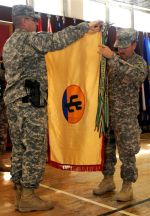WASHINGTON — As President Barack Obama this week hailed “one of the largest logistics operations we’ve seen in decades” accompanying the force drawdown in Iraq, the commander overseeing the movement credited hard work and intensive preparation with ensuring the mission proceeds smoothly and ahead of schedule.
“We’re moving out millions of pieces of equipment,” the president said in a speech to the Disabled American Veterans describing progress toward reducing the U.S. footprint in Iraq to 50,000 troops by Sept. 1, and ultimately to zero by the end of 2011.
Army Brig. Gen. Mark Corson, commander of the Army Reserve’s 103rd Expeditionary Sustainment Command, is the point man on the ground charged with overseeing the logistical withdrawal while continuing to support forces on the ground.
Conducting the largest re-posturing of forces and equipment in more than 40 years is nothing short of “monumental,” he acknowledged during a phone interview with American Forces Press Service from his headquarters at Joint Base Balad in Iraq. It’s an around-the-clock operation that involves flying several thousand troops and moving 3,000 to 4,000 trucks loaded with their accompanying equipment, property and supplies to Kuwait or the Iraqi port of Umm Qasr every day.
The pace of the exodus – about 72,000 pieces of equipment a month since June 2009 – is up, Corson reported. During May alone, U.S. forces returned 146,700 pieces of equipment to the United States, including 2,700 vehicles, generators, trailers and material-handling equipment.
Most of the equipment gets returned to the States, some gets sent forward to troops in Afghanistan, and under tightly controlled conditions based on a congressional mandate, some gets left behind for use by Iraqi security forces.
Just five weeks after assuming command of the logistical drawdown, Corson said he’s satisfied by the progress. “So far, it’s going extremely well,” he said. “We are actually two weeks ahead of schedule.”
That’s a far cry from how Corson felt back in 2003, when, as commander of the 450th Control Battalion, his focus was on surging massive quantities of logistical support into Iraq to support the initial U.S. troops there.
“We got here about two weeks after forces crossed the berm (into Iraq) and found ourselves playing catch-up,” he said of the initial deployment. Working with communications equipment they were issued on arrival, and having to set up the systems and processes support the logistical operation, Corson called the mission “a period of high adventure.” “The Army did its best to train us for what we were going to face during [Operation Iraqi 1] during the liberation of Iraq, but the truth was, we didn’t know what we were going to face,” he said. “We found that the adaptability and resourcefulness of the American servicemember really came into play, because we made a lot of our processes up and perfected them on the spot – and we were successful.”
Drawing down in Iraq is a whole different story. “We now have excellent facilities, excellent infrastructure and excellent communications,” Corson said. “The biggest challenge facing us now is that we have so much stuff… and we have to make sure the movement is all coordinated, and that we execute it well and safely while also sustaining the force.” And with a clearer sense of what the drawdown mission would entail, the Army was able to set up Corson’s team for success from the start.
“A tremendous amount of planning went into this, in very great detail, so we came into a very well-planned operation,” he said.
Corson and his key staff spent months interfacing with the unit they replaced in Iraq, the 13th Expeditionary Sustainment Command, before the deployment to ensure a smooth transition.
They also participated in several major exercises, including a massive command post exercise at Fort Lee, Va., that Corson said prepped them staff for many of the situations they’re now encountering in Iraq “It’s like we were in a simulator,” he said. “When we face challenges here, I tell people, we have seen this before. We have done this before.”
“We’re extremely well-trained for this, and that is one of the reasons I think it’s going so well,” he continued. “It’s because so much effort on the part of the services was put into this that it set us up for success.”
Now on the ground, Corson credits his team of active-duty, Army Reserve and National Guard soldiers, airmen, sailors, civilians and contractors with putting this preparation to work as they endure grueling hours, stifling heat and challenging conditions to keep the mission on track.
He paid particular tribute to the truck drivers and convoy escort teams who run 70 to 100 convoys every day, bumping their way down Iraq’s roadway system that’s notoriously busy by day and long and lonely by night.
“These are some of the hardest-working folks I’ve ever met, and everybody wants to be here,” he said. “The typical workweek is a 13- or 14-hour day, six-and-a-half days a week, and if we didn’t make them take that half day, many of them wouldn’t.”
Concerned that they may be pushing themselves too hard – particularly in light of progress already made — Corson recently directed a “safety stand-down” so his troops can “catch their breath” and perform extra vehicle as well as personal maintenance. The mission will continue 24/7, he said, but at a slightly slower pace in the interest of keeping it safe. These troops “are doing a fantastic job of getting things were they need to be and getting the material out,” Corson said, and all recognize the magnitude of their mission. “Folks are very excited about this because they know that once again, we are making history, and this is their opportunity to contribute.”
Source:
U.S. Department of Defense
Office of the Assistant Secretary of Defense (Public Affairs)

 von
von 